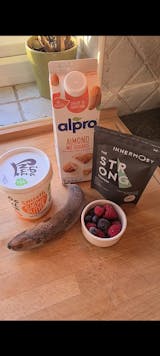Pomegranates have been used for medicinal purposes for thousands of years to treat infections, diarrhoea, ulcers, and are still regarded in some parts as a potent fertility booster.
Background
Rich in many nutrients, including Vitamin C and Vitamin K, folic acid and potassium. More recently, there has been interest in pomegranates due to their high antioxidant levels compared to other fruits, along with research suggesting anti-inflammatory and anti-obesity properties.
What are pomegranates?
One of the oldest fruits known to man, pomegranates are native to grasslands stretching from the Middle East to the Himalayas and south to India. With a tough red skin, the pomegranate is prized for its seeds, which have a distinctive sweet and sour taste. The seeds are great as a snack by themselves, but are also super popular in salads for their refreshing and crunchy nature.
The question is - are pomegranates good for you? Yes, surprisingly so.
The health benefits of pomegranates
Surprisingly - pomegranate benefits are pretty extensive. Pomegranates contain high levels of ellagitannins (including punicalagins) and ellagic acid. These compounds act as potent antioxidants and can be metabolised into other antioxidant-rich compounds. Punicalagins have almost triple the antioxidants of green tea and red wine, and are said to be responsible for multiple health benefits.
- Great anti-inflammatory properties
- Aids joint pain
- Reduces risk of heart disease
- Improves memory
- Improves exercise performance
They are also said to help with weight control and maintaining healthy cholesterol levels. In addition, early studies have shown that the compounds in pomegranates can increase the numbers of healthy bacteria in the gut, and inhibit the growth of pathogenic bacteria thereby helping reduce disease incidence.
Pomegranate Supplements
So there we have it, the answer to the question we've all been wondering: are pomegranates good for you? Absolutely.
As a result of this, pomegranates are one of the ingredients in our The Lean Protein. Pomegranate supplements such as The Lean Protein are recommended for anyone aiming to lose weight in a sustainable way and to help with recovery after putting your bodies through the strain of exercise. Along with the other ingredients found in The Lean Protein, this blend aims to nourish and tone your body, whilst ensuring you're benefiting from all the pomegranate health benefits we've mentioned above.
You can find our best tips and tricks when it comes to toning up your body here - with a bunch of workouts, diets and advice from our Innermost team and Insiders.
References
- M. I. Gil, F. A. Tomas-Barberan, B. Hess-Pierce, D. M. Holcroft, and A. A. Kader, “Antioxidant activity of pomegranate juice and its relationship with phenolic composition and processing,” Journal of Agricultural and Food Chemistry, vol. 48, no. 10, pp. 4581–4589, 2000. Click here.
- González-Ortiz, Manuel, et al. "Effect of pomegranate juice on insulin secretion and sensitivity in patients with obesity." Annals of Nutrition and Metabolism. 58.3 (2011): 220-223. Click here.
- Viladomiu, Monica, et al. "Preventive and prophylactic mechanisms of action of pomegranate bioactive constituents." Evidence-Based Complementary and Alternative Medicine. (2013). Click here.
- Bialonska, Dobroslawa, et al. "The influence of pomegranate by-product and punicalagins on selected groups of human intestinal microbiota." International journal of food microbiology. 140.2 (2010): 175-182. Click here.
- Al-Muammar, May Nasser, and Fozia Khan. "Obesity: The preventive role of the pomegranate" Nutrition 28.6 (2012): 595-604. Click here.
- Bialonska, Dobroslawa, et al. "The effect of pomegranate (Punica granatum L.) byproducts and ellagitannins on the growth of human gut bacteria." Journal of Agricultural and Food Chemistry. 57.18 (2009): 8344-8349. Click here.
- Saruwatari A, et al Pomegranate juice inhibits sulfoconjugation in Caco-2 human colon carcinoma cells. Journal of Medical Food. (2008). Click here.
























